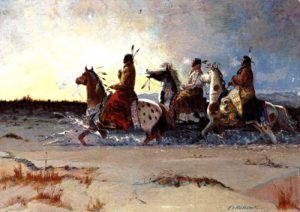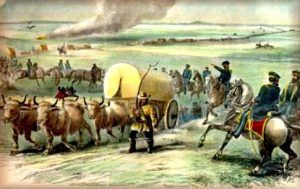On June 7, 1847, Lieutenant John Love led a group of about 80 soldiers of Company B out of Fort Leavenworth, Kansas, to the Santa Fe Trail. Their orders were to escort a paymaster to Santa Fe, New Mexico. Protecting paymaster Major Charles Bodine, 12 wagons, and about $350,000 payroll, the troops set out to reach the Pawnee Fork Crossing near present-day Larned, Kansas, on June 23, 1847. From the time they had crossed the Little Arkansas River, they had spied a number of Kiowa and Comanche Indians and were on high alert.
On the morning of June 24, the troops crossed the Pawnee Fork in high water, which made for a long and difficult day. They finally succeeded, making camp on the other side of the crossing.

Comanche Indians
The following day, the troops caught up with another wagon train headed by a man named Hayden. The two groups encamped near each other next to the Arkansas River. On June 26th, the livestock was allowed to graze in the valley when Comanche Indians attacked Hayden’s campsite. Love and his troops quickly mounted up to resist the attack, but not before the livestock were all run off. More Indians then appeared, and rather than chasing the livestock, Love and his men fell back to protect the paymaster and the payroll as he had been assigned to do.
During the battle, six soldiers were killed, their bodies mutilated after death. Six more were wounded. Love and his men allowed the wounded to heal before taking off once again on July 2nd. The battle was referred to in the newspaper as “Lieutenant Love’s Defeat,” even though they had followed orders and protected the payroll.
The battle site is located about 9 ½ miles west of Garfield, Kansas, on U.S. Highway 56 and is designated with a marker on the south side of the highway.
©Kathy Alexander/Legends of America, updated January 2024.
Also See:
Indian Wars, Battles & Massacres

